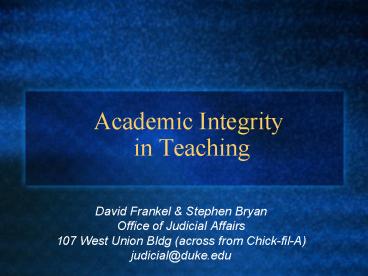Academic Integrity in Teaching
1 / 24
Title:
Academic Integrity in Teaching
Description:
... students admit to cheating ... for cheating are not severe. Cheating higher at larger, less ... chance of getting caught. Source: Donald McCabe, Rutgers ... –
Number of Views:59
Avg rating:3.0/5.0
Title: Academic Integrity in Teaching
1
Academic Integrity in Teaching
- David Frankel Stephen Bryan
- Office of Judicial Affairs
- 107 West Union Bldg (across from Chick-fil-A)
- judicial_at_duke.edu
2
Prevalence of Cheating
- gt75 of college students admit to some cheating
- 1999 10 of students admitted to cutting and
pasting without attribution from the internet
2001 41 - 3/4 of high school students admit to cheating
- Source Center for Academic Integrity,
www.academicintegrity.org
3
Cheating at Duke
4
Types/Sources of Plagiarism
- Cutting pasting from the internet
- Straight downloads (usually from pay sites)
- Journal articles/books
- Friends
- Test files
5
Types/Sources of Cheating
- Altered exam for re-grade
- Looking off someone elses paper
- Other schools text messaging
- Notes in exam room/bathroom
- Same paper, multiple classes
- Working outside time constraints
6
The Duke Community Standard
- Duke University is a community dedicated to
scholarship, leadership, and service and to the
principles of honesty, fairness, respect and
accountability. Citizens of this community commit
to reflect upon these principles in all academic
and non-academic endeavors, and to protect and
promote a culture of integrity.
7
The Duke Community Standard
- To uphold the Duke Community Standard
- I will not lie, cheat, or steal in my academic
endeavors - I will conduct myself honorably in all my
endeavors and - I will act if the Standard is compromised.
8
Academic Dishonesty
- Lying
- Ex Telling instructor relative died in order to
get an extension on a paper falsifying signature
on attendance sheet - Cheating
- Stealing
- Ex Taking exam
9
Why do students cheat?
- Dire straits at the last minute
- Ease of Internet
- External pressures/internal stress
- Competition
- Consumer mentality
10
Institutional factors that influence cheating
- ?Cheating is campus norm (cheating culture)
- ?School has no honor code
- ?Penalties for cheating are not severe
- ?Cheating higher at larger, less selective
schools - ? Faculty understanding/support of academic
integrity policies is low - ? Little chance of getting caught
- Source Donald McCabe, Rutgers University
11
Cheating Plagiarism Charges
12
Preventive Steps 3PsPromotion, Prevention,
Policing
- Statement on syllabus
- Clarify expectations and extent of collaboration
permitted - Signed statement for assignments/tests
- Discuss detection methods
- Alternate versions of exams
- Remind students about their obligations
- Role model appropriate citation
13
Case Study 1
- You are grading a paper when you detect a shift
to a more sophisticated style of writing.
Curious, you check google.com and discover a
website with verbatim and nearly verbatim text
contained in the paper. Attribution for some of
the copied text is to a book. None of the
verbatim text is in quotes.
14
Case Study 1
- You email the student with your concerns. You
receive a response back the next morning. The
student said that he accidentally emailed you the
wrong version of his paper, and attaches another
file.
15
Case Study 1
- You refer the matter to Judicial Affairs in the
Dean of Students Office. The next day, you
receive a phone call and an email from the father
of the student.
16
Case Study 1
- In consultation with the Office of Judicial
Affairs, you agree to resolve the matter through
a faculty-student resolution. - http//www.integrity.duke.edu
17
AIC Website
18
Case Study 2
- You are grading lab assignments when you come
across two very similar labs. You feel there is
very little chance that this is coincidence. You
examine the labs closer and sense that one
student copied an answer from another students
detailed solution.
19
Case Study 2
- You email both students with your concerns. You
receive a response back the next morning. One
student said that he and the other student were
working on the lab assignments in the library at
the same time but both worked independently. The
other student said he reached his answer
independent of anyone else.
20
If you suspect cheating or plagiarism
- Were here to help!
- 684-6938
- judicial_at_duke.edu
- Tell us what you suspect or have discovered
- Well discuss appropriate steps
21
A Typical Case of Academic Dishonesty
- Instructor suspicious
- The investigation process
- Possible option Faculty-Student Resolution
- The hearing
- The outcome
- The appeal
- The record
- The grade
22
Importance of Consulting with Us(or, points to
raise with your faculty mentor)
- Consistency in response
- Due process
- Problems in other classes/areas
- Behavioral issue
- Means of assessment
23
Grading Options
- Grading independent of the formal disciplinary
process - Options
- Reduced grade / F on the assignment
- Reduced grade / F for the course
- Assignment discounted entirely
- If at the end of the semester, do not submit a
grade of incomplete
24
Questions / Comments






























